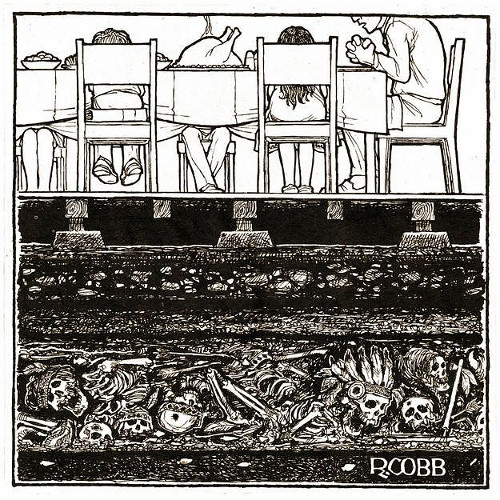Navajo environmental protesters. Photo: Nihígaal bee Iiná
Thanksgiving: celebrating the privilege to forget
- November 26, 2015
Land & Liberation
Forget the past and today’s suffering, and join in the collective act of giving thanks. But beware not to remember and mourn all that has been lost.
- Author
America is the land of amnesia. “Forget who you were, so that you can become American,” we are told.
Because who we were has no buying power in the colony. This is the land of skyrisers, not basements. Turn in our luggage, our languages. Uproot our identities, in exchange for new and better selves, complete with a well-earned white picket fence and an office with a view. Happy hour, golden retriever, two-week-paid vacation in Barbados, summering in the Hamptons. Take it now and leave everything else behind, this place was made for us.
Who we were would only confuse or anger those who have already properly assimilated. My blood is Sicilian, but I speak no Italian. I don’t even know how to pronounce my own last name correctly. The pasta maker in my mother’s kitchen is the only remaining vestige of my Mediterranean ancestry; the only connection I have to the lost.
But actually, this experience applies only for the privileged among us. Those of us whose parents and grandparents were allowed to choose forgetfulness in pursuit of capital, the American dream, are now encouraged to participate in the broader process of suppressing those who were never given this choice.
So on this thanksgiving, we are all American. We must all sit at the dinner table and choose forgetfulness: “Don’t bring up politics and rain on everyone’s parade. This holiday isn’t about ethnic cleansing; it’s about sharing and giving thanks now.”
 Welcome to our Shangri La; our exclusive paradise where as long as one is an owning class, educated, white, able-bodied, cis-gender, heterosexual male English speaker with proper documentation, one has a seat at the table and a voice that will be heard. Regardless of whether one has a seat at the table, we all damn well better be thankful.
Welcome to our Shangri La; our exclusive paradise where as long as one is an owning class, educated, white, able-bodied, cis-gender, heterosexual male English speaker with proper documentation, one has a seat at the table and a voice that will be heard. Regardless of whether one has a seat at the table, we all damn well better be thankful.
In many regards, those at the table are free: free from concern about losing property as it is appropriated in land grabs by the state, free from the burden of considering racial, gender, and legal-status categories as crucial determinants in ability to survive.
It is a freedom that provides suburban families central air while people of the Navajo nation choke on coal dust. Capitalism eats the lives of occupied peoples, collateral damage in a process of wealth accumulation. Our industries seep up, contaminate the ground water that once sat fresh and clean beneath what is left of the Navajo lands, so that America can maintain a healthy middle class with access to affordable electricity.
Black lives are cut short with the shot of a police gun, the poison of an unjust food system, countless violences of inherited dispossession and systemic racism. Beyond territorial borders, the finances of the American colonial project, for which so many nice families are thankful, fund the ammunition of other colonies, where other colonized people continue to resist the encroachment of capitalism’s beneficiaries.
Subhuman, those subaltern people always already are, just as other black and brown people have been throughout contemporary history. “They should go, as should the physical homes in which they raised the snakes. Otherwise, more little snakes will be raised there.” How many homes have been destroyed, how many humans have been killed by those whose white-supremacist, euro-arrogant hallucinations transform children into serpents.
Gently, let’s all be thankful for forgetfulness.
Those of us whose grandparents turned in their cultures in exchange for capital and social inclusion, we must be thankful for, though not overly cognizant of, our privileges. Everyone else must forget the past, forget the present dispossessions in order to join in the act of giving thanks. And in giving thanks, no space will be left for us to collectively remember and mourn all that has been lost.
Source URL — https://roarmag.org/essays/thanksgiving-america-colonial-history/
Further reading
Swedish fascists burn homes, blame crisis on refugees
- Rory Smith
- November 28, 2015
In defense of the Grayzone: between ISIS and the West
- Sam Law
- November 23, 2015

